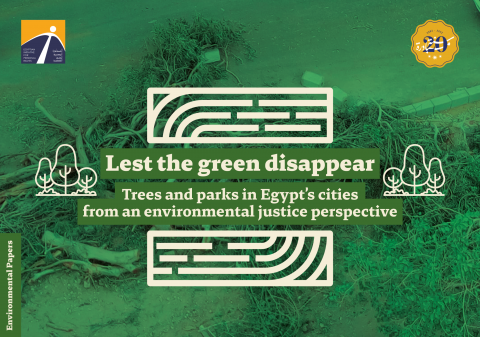Lest the green disappear - trees and gardens in Egypt's cities from the perspective of environmental justice.
Today, Saturday, the Egyptian Initiative for Personal Rights issued a new paper in the environmental justice dossier entitled "Lest the green disappear - trees and gardens in Egypt's cities from the perspective of environmental justice."
The paper begins by noting what has happened in recent years, where logging has become a frequent phenomenon that accompanies projects for building and developing service facilities, in a way that does not take into account the environmental function of trees and green spaces, especially in cities. Trees and green spaces are considered an intuitive, effective, and cost-effective solution to the problems of air and noise pollution, providing shade in the streets, and cooling them in light of the record increases in temperatures in recent decades.
The paper then noted that the countryside trees, in turn, were not spared the "development" processes. At least thousands of trees were uprooted during the implementation of the canals and drains lining project, without announcing any environmental impact studies to remove those trees or specifying a clear methodology for removal or to reduce cutting operations to the minimal extent possible.
In its analysis of these policies, the paper drew attention to the need for the government to develop strategies for the various sectors to achieve sustainable development and adapt to the effects of climate change, especially at the present moment, when Egypt is hosting the Climate Conference (COP27). It also stressed the importance of the government setting realistic, declared goals for the per capita percentage of green spaces in cities, for investing in tree planting, and for providing green spaces, as feasible and low-cost measures to reduce heat and air pollution in cities.
The paper takes the form of 10 questions and answers dealing with different aspects of the issue of trees and green public spaces in Egypt. It tries to shed light on issues such as the number of trees, the percentage of green spaces, their importance to the environment and the health of Egyptians, and their many other benefits. The paper also deals with the legal aspects of protecting trees in Egypt, and presents a comparison of the percentages determined by these laws and the global percentages of the per capita share of green spaces. The paper concludes by warning about the right of citizens and their role in participating in decision-making regarding trees and green spaces, and on the aspects of legal protection of this right.
The paper "Lest the green disappear" was prepared by Muhammad Younes, EIPR researcher in the environmental justice program; legal aspects were drafted by Ahmed Al-Saeedi, lawyer and researcher in the same program.




